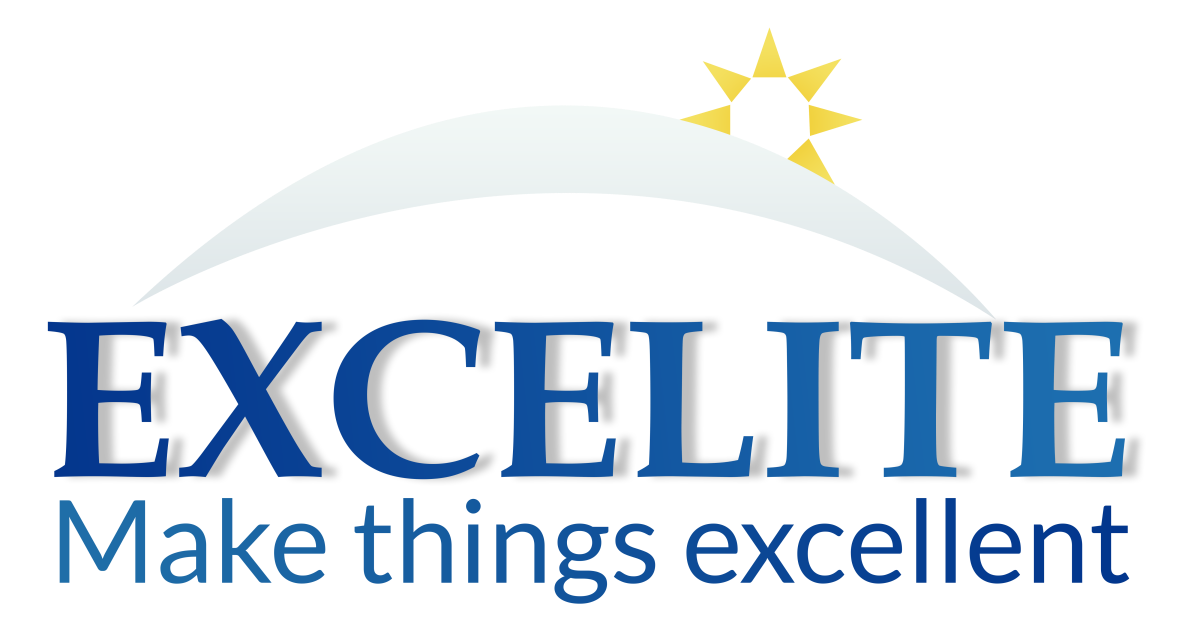Hard Coated Polycarbonate Sheet
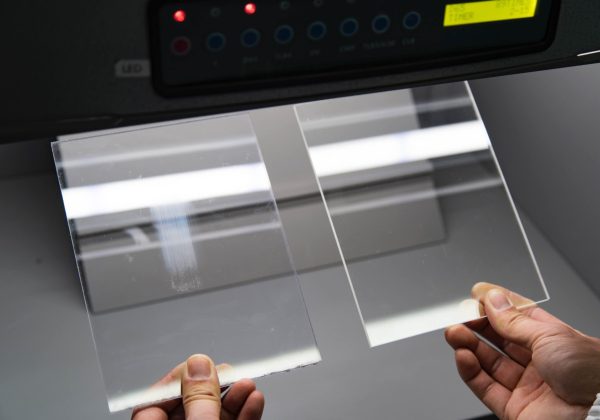
Introduction to Hard Coated Polycarbonate
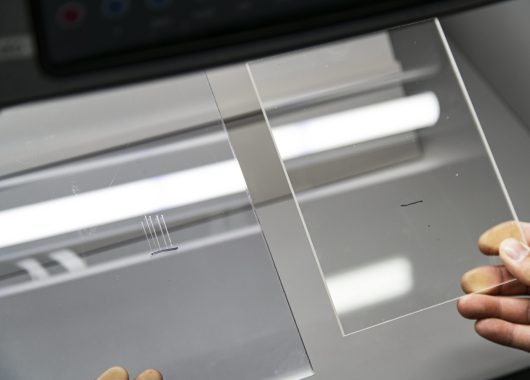
Benefits of Hard Coated Polycarbonate
Polycarbonate, in its basic form, is already a material of choice for many industries due to its impressive strength, flexibility, and transparency. However, its surface can be prone to scratches and chemical damage, which can limit its functionality in certain applications. This is where hard coated polycarbonate (a type of scratch resistant polycarbonate sheet) comes into the picture.
The hard coating process involves applying a protective layer to the polycarbonate, enhancing its durability and resistance to various forms of damage. This process does not compromise the inherent properties of polycarbonate but rather enhances them, making hard coated polycarbonate a superior material for many applications. Here are the key benefits in more detail:
- Enhanced Scratch Resistance: One of the primary benefits of hard coated polycarbonate is its enhanced scratch resistance. The hard coating forms a protective barrier on the surface of the polycarbonate, making it more resistant to scratches caused by abrasive materials or rough handling. This ensures that this abrasion-resistant polycarbonate maintains its optical clarity and aesthetic appeal over time, even in demanding environments.
- Superior Abrasion Resistance: In addition to scratch resistance, hard coated polycarbonate also exhibits superior abrasion resistance. This means it can withstand continuous contact with harsh substances or conditions that would typically wear down other materials. This makes this abrasion-resistant polycarbonate an ideal choice for applications in industries such as construction, manufacturing, and automotive, where materials are often exposed to abrasive conditions.
- Increased Chemical Resistance: Polycarbonate, while a robust material, can be susceptible to damage from certain chemicals. The hard coating on hard coated polycarbonate provides a barrier that protects the underlying polycarbonate from these chemicals. This increased chemical resistance ensures the longevity of the material and maintains its optical clarity, even when exposed to harsh chemical environments.
- Retained Impact Resistance: Despite the added hard coating, hard coated polycarbonate retains the high impact resistance that polycarbonate is known for. This makes it a safer alternative to materials like glass in many applications, as it is less likely to shatter upon impact.
- Preserved Light Transmission and Optical Clarity: The hard coating process does not affect the high light transmission and optical clarity inherent to polycarbonate. This means that hard coated polycarbonate can still provide clear visibility, making it ideal for applications such as windows, protective screens, and optical devices.
- Improved Heat Resistance: Hard coated polycarbonate can withstand high temperatures, making it suitable for applications exposed to heat. This heat resistance, combined with its other enhanced properties, makes hard coated polycarbonate a versatile material that can meet the demands of various high-performance applications.
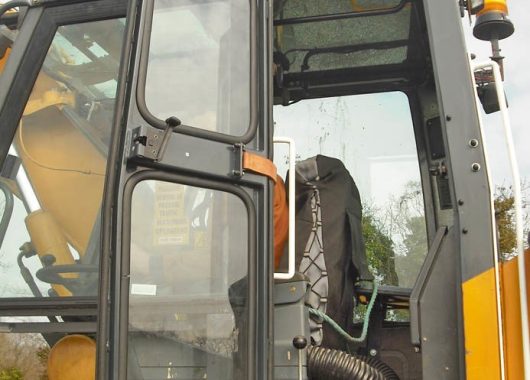
Applications of Hard Coated Polycarbonate
The enhanced properties of hard coated polycarbonate make it a versatile material that can be used in a wide range of applications. Its combination of strength, transparency, and resistance to scratches, abrasion, and chemicals makes it a superior choice for many industries. Here’s a closer look at some of the key applications:
Automotive Industry
The automotive industry requires materials that can withstand harsh conditions while providing safety and performance. Hard coated polycarbonate meets these requirements, making it an ideal choice for automotive applications particularly polycarbonate windshields. It is often used for windshields and windows due to its scratch resistance, impact resistance, and optical clarity. Its ability to withstand high temperatures also makes it suitable for components near the engine or exhaust systems.
Machine Guards
Safety is paramount in any industrial setting, and machine guards play a crucial role in protecting workers from potential hazards. Hard coated polycarbonate is an excellent material for machine guards as it provides clear visibility, allowing workers to monitor the machine’s operation while staying protected. Its scratch and impact resistance ensure long-lasting performance, even in environments with high levels of debris and contact.
Glazing Applications
Glazing requires materials that can provide clear visibility, withstand environmental conditions, and offer safety in case of breakage. Hard coated polycarbonate fits the bill perfectly. Its high light transmission, impact resistance, and enhanced durability make it a popular choice for glazing applications, including windows, skylights, and even greenhouses.
Electronics Industry
Electronic devices often require materials that can protect sensitive components without compromising design or functionality. The scratch and chemical resistance of hard coated polycarbonate make it suitable for electronic devices, where it can protect screens from scratches and resist damage from cleaning chemicals. Its high light transmission and optical clarity also make it ideal for display covers and touch screens.
Bulletproof and Anti-Ballistic Panels
The high impact resistance of hard coated polycarbonate makes it an excellent choice for bulletproof and anti-ballistic panels. These panels are used in a variety of settings, including educational institutions, psychiatric hospitals, and storefronts, providing protection against potential threats while maintaining clear visibility.
Doors and Windows
Hard coated polycarbonate is often used in doors and windows, especially in areas prone to hurricanes or other severe weather conditions. Its high impact resistance and durability ensure that it can withstand the force of extreme weather, providing protection for buildings and their occupants.
Hurricane Protection
In areas prone to hurricanes, hard coated polycarbonate can be used to protect windows and other vulnerable parts of buildings. Its high impact resistance ensures that it can withstand the force of flying debris, while its transparency allows for clear visibility even during a storm.
At Excelite Plastics, we understand the diverse needs of these applications and more. We provide high-quality hard coated polycarbonate sheets that meet ISO standards for quality, ensuring you receive the best material for your project.
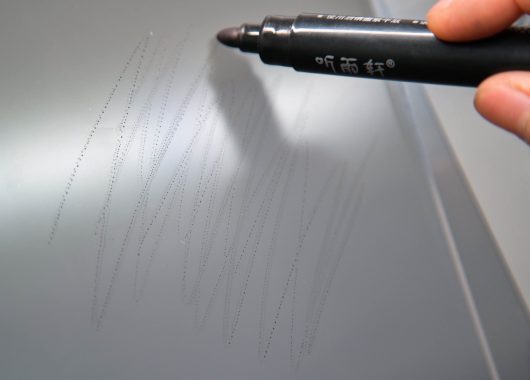
Section 1: What Sets Hard-Coated Polycarbonate Apart?
Hard-coated polycarbonate stands out as a unique material that combines durability, clarity, and versatility. This clear polycarbonate variant is enhanced with a special coating that significantly improves its resistance to abrasion and scratching, making it an ideal choice for applications where maintaining clear visibility and durability is paramount.
The hard coating also imparts UV-resistance to the polycarbonate, preventing it from yellowing or degrading when exposed to sunlight. This is a significant advantage for outdoor applications. Furthermore, despite the hard coating, this clear polycarbonate retains the lightweight and impact-resistant properties of standard polycarbonate, making it a robust and practical material for a myriad of uses.
Key features of hard-coated polycarbonate include:
- Abrasion-Resistant: The hard coating on the polycarbonate provides abrasion resistance compared to standard polycarbonate and even acrylic sheets. This means that this abrasion-resistant polycarbonate can withstand heavy use without showing signs of wear and tear.
- UV-Resistance: The hard coating also imparts UV-resistance to the polycarbonate, preventing it from yellowing or degrading when exposed to sunlight. This is a significant advantage for outdoor applications.
- Lightweight and Impact-Resistant: Despite the hard coating, this clear polycarbonate retains the lightweight and impact-resistant properties of standard polycarbonate, making it a robust and practical material for a myriad of uses.
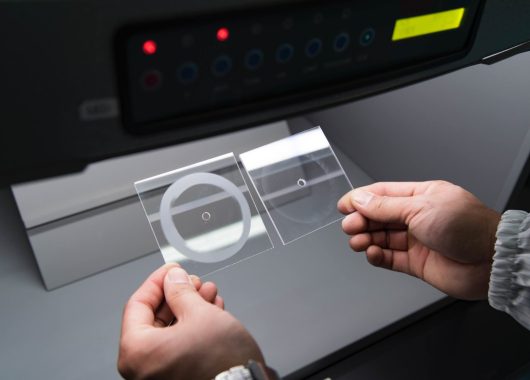
Section 2: The Manufacturing Process of Hard-Coated Polycarbonate
The production of hard-coated polycarbonate involves several stages. Initially, the raw polycarbonate is melted and extruded into sheets or films at high temperatures. These polycarbonate films are then cooled and cut to the desired size.
The hard coating is applied in a separate process. The polycarbonate films are cleaned and prepared, often using a solvent, to ensure the coating adheres properly. The coating, typically a silicone or acrylic-based compound, is then applied to the polycarbonate using a process such as dip coating, flow coating, or spray coating. The coated sheets are then cured at room temperature or in a heating chamber to harden the coating and bond it to the polycarbonate.
Key steps in the manufacturing process include:
- Preparation: The polycarbonate films are cleaned and prepared, often using a solvent, to ensure the coating adheres properly.
- Coating Application: The coating, typically a silicone or acrylic-based compound, is then applied to the polycarbonate using a process such as dip coating, flow coating, or spray coating.
- Curing: The coated sheets are then cured at room temperature or in a heating chamber to harden the coating and bond it to the polycarbonate.
Section 3: Why Opt for Hard-Coated Polycarbonate Over Non-Coated Polycarbonate?
Choosing hard-coated polycarbonate over non-coated polycarbonate offers several advantages. The most significant benefit is the enhanced scratch resistance. The hard coating provides a protective layer that resists scratches and abrasions, extending the lifespan of the material and maintaining its clear, polished appearance over time.
In addition, the hard coating provides UV-resistance, protecting the polycarbonate from the damaging effects of sunlight. This makes hard-coated polycarbonate an excellent choice for outdoor applications, where UV exposure can cause non-coated polycarbonate to yellow or degrade.
Key reasons to choose hard-coated polycarbonate include:
- Enhanced Scratch Resistance: The hard coating provides a protective layer that resists scratches and abrasions, extending the lifespan of the material and maintaining its clear, polished appearance over time.
- UV-Resistance: The hard coating provides UV-resistance, protecting the polycarbonate from the damaging effects of sunlight. This makes hard-coated polycarbonate an excellent choice for outdoor applications, where UV exposure can cause non-coated polycarbonate to yellow or degrade.
Section 4: Hard-Coated Polycarbonate or Acrylic: Which is the Right Choice for Your Project?
When deciding between hard-coated polycarbonate and acrylic for your project, it’s important to consider the specific requirements of your application. Both materials offer excellent clarity and light transmission, making them suitable for applications where visibility is important.
However, hard-coated polycarbonate has a higher impact resistance than acrylic, making it a better choice for applications where the material may be subjected to impact or heavy use. Additionally, hard-coated polycarbonate offers superior scratch and abrasion resistance compared to acrylic, ensuring it maintains its clear, polished appearance for longer.
On the other hand, acrylic sheets may be a more cost-effective option for applications where high impact resistance and scratch resistance are not as critical. It’s also worth noting that while both materials can be cut and shaped using a CNC machine, polycarbonate tends to be easier to work with due to its flexibility and lower risk of cracking.
Key considerations when choosing between hard-coated polycarbonate and acrylic include:
- Impact Resistance: Hard-coated polycarbonate has a higher impact resistance than acrylic, making it a better choice for applications where the material may be subjected to impact or heavy use.
- Scratch and Abrasion Resistance: Hard-coated polycarbonate offers superior scratch and abrasion resistance compared to acrylic, ensuring it maintains its clear, polished appearance for longer.
- Cost: Acrylic sheets may be a more cost-effective option for applications where high impact resistance and scratch resistance are not as critical.
- Workability: While both materials can be cut and shaped using a CNC machine, polycarbonate tends to be easier to work with due to its flexibility and lower risk of cracking.
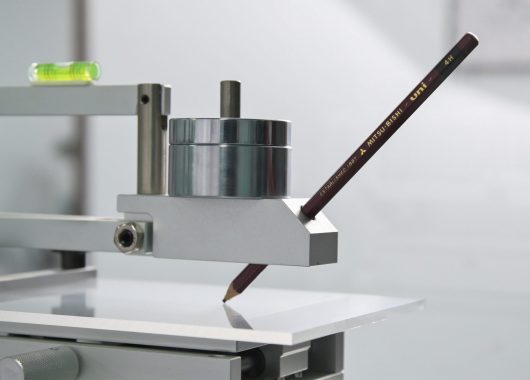
Section 7: Why is Hard-Coated Polycarbonate the Preferred Choice for Optically Clear Applications?
Frequently Asked Questions
What is hard polycarbonate?
Hard polycarbonate refers to polycarbonate sheets that have undergone a special coating process to enhance their scratch and abrasion resistance. This hard coating also improves the UV resistance and longevity of the polycarbonate.
How do you hard coat polycarbonate?
Hard coating is applied to polycarbonate sheets through a process that involves applying a special coating material and then curing it under controlled conditions. This process enhances the durability and scratch resistance of the polycarbonate.
Can you make polycarbonate scratch resistant?
Yes, polycarbonate can be made scratch resistant through the application of a hard coating. This coating significantly improves the polycarbonate’s resistance to scratches and abrasions.
Is polycarbonate more scratch resistant than acrylic?
While both materials are durable, hard-coated polycarbonate tends to be more scratch resistant than acrylic. This makes it a preferred choice for applications where durability and longevity are crucial.
What is a disadvantage of hard coated polycarbonate?
While hard-coated polycarbonate offers many benefits, it can be more expensive than regular polycarbonate due to the additional coating process. However, the enhanced durability and longevity often justify the extra cost.
What are the advantages of polycarbonate?
Polycarbonate is known for its high impact resistance, excellent light transmission, and flexibility. When hard-coated, it also offers superior scratch and abrasion resistance, making it a versatile material for various applications.
What are the benefits of hard coating polycarbonate?
Hard coating enhances the scratch and abrasion resistance of polycarbonate. It also improves its UV resistance, reducing the risk of yellowing or degradation over time. This results in a more durable and long-lasting material.
What is polycarbonate used for?
Polycarbonate is used in a wide range of applications due to its versatility. It’s commonly used in glazing, protective shields, display covers, automotive components, and more.
What is the difference between a hard coated polycarbonate and a regular polycarbonate?
The main difference lies in the scratch and abrasion resistance. While regular polycarbonate is already a durable material, hard-coated polycarbonate has an additional layer that enhances its resistance to scratches and abrasions, making it even more durable.
Can you blow polycarbonate?
Yes, polycarbonate can be blow molded into various shapes. This process involves heating the polycarbonate and then inflating it with air to form a specific shape. However, this process is typically used for creating hollow objects, like bottles, rather than flat sheets.
Conclusion
Contact Us
Get A Quote Today
Bring Your Ideas to Life with Excelite Plastics.
Custom Polycarbonate Solutions Tailored for You.
Share Your Project With Us!
+86 135 8555 4902
